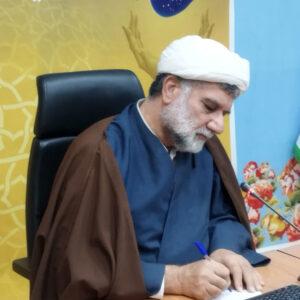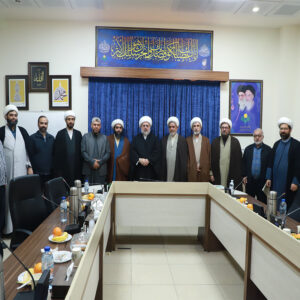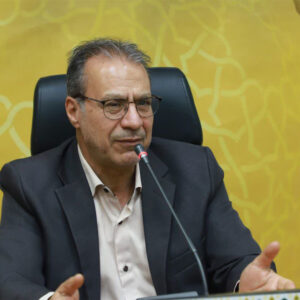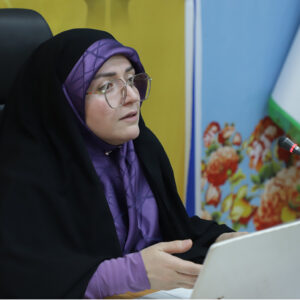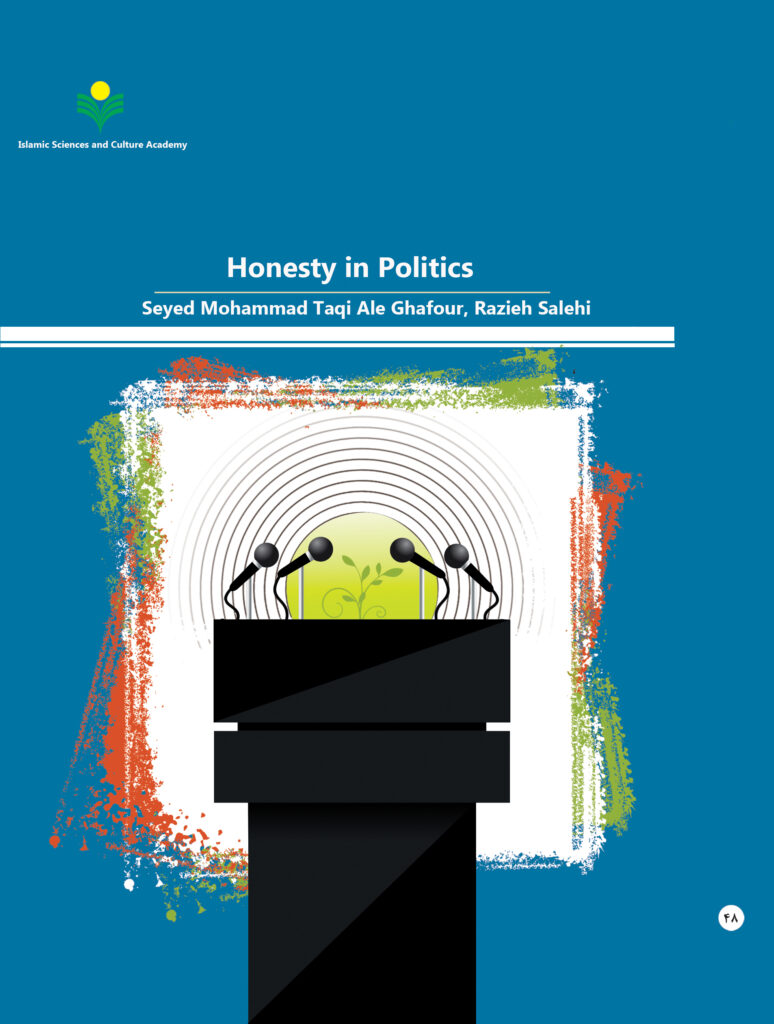Honesty in Politics
Authored by: Ale-Ghafoor, Seyyed Mohammad Taghi & Razieh Salehi
Zare’ei, Raziyeh
Keywords: ethics, politics, political institutions, honesty, lies and deception.
Statement of the problem:
Only with the help of correct ethics and calling people to moral virtues, it is possible to reform humans and save them from social corruption, wars and bloodshed. To preserve humanity and for the possibility of perpetuating the important values of the society, such as equality, freedom of speech, ethics, etc., we should move towards transparency and honesty in behavior and speeches and socio-political structures and institutions. The more the society moves away from honesty and truth and moves towards lies, the more mistrust the prevailing atmosphere of the society will be involved in many challenges and wanderings. The facts of human life and scientific, practical and historical experiences show that whenever in a society, moral behavior and social and family relationships are honest, sincere and far from deception and lies, and if people consider them as a social contract and in the form of an unwritten law and the accepted principles, then security, peace and happiness will be given to each individual in the society. The stable trust of the people in each other and in the governments, and reciprocally the trust of the rulers in the people, leads to the preference of honesty and truthfulness over lying and deception, and places the citizens in a psychologically reassuring atmosphere, and it will significantly increase the level of participation and preference of public interests over personal interests and will create bright and hopeful prospects in such societies. However, one can’t be hopeful to improve social, political, and economic life as long as lies, deception, hypocrisy, and trickery spread in a society and the relationships between individuals, groups, and officials.
Of course, there are lies and dishonesty in all countries to a greater or lesser degree. However, by that, we mean a situation in which lies become systematic to the point that it can be considered a part and parcel of political and administrative culture. In this situation, many parts of the administrative system are taken over by a network of dishonesty and all kinds of lies prevail in the relations between the government and institutions and the people as well as between the people themselves.
Primary and Secondary Questions:
With all this comprehensive moral and cultural emphasis on honesty and fundamental condemnation of lies as the key to inadequacies, why do public culture, political culture, social structures, and civil institutions suffer from the lack of honesty and the spread of lies in various forms and branches? What are the solutions to overcome this problem?
In order to answer the primary question above, this research pursues the aforementioned question along with the following secondary questions:
- What is the domain of the lack of honesty and the promotion of lies in Iran’s political institutions?
- What causes and social contexts have been led to this moral, social and political anomaly?
- Based on Islamic culture, what ideal status can be illustrated for different levels of social structures, civil institutions and official and informal political institutions in terms of honesty?
- What solutions can be provided to overcome the existing abnormal situation and reach the ideal situation?
Objectives
The focus of this research is on the socio-political contexts and factors of the prevalence of lying in different dimensions and the explanation, description and analysis of its effects and consequences at the levels of general culture of Iranian society, civil society and political society and providing solutions to this problem. It is appropriate and necessary in Islamic Iran, which has an Islamic political system and the culture of the society is a religious culture, that politics should be founded on the basis of honesty, and in general, politics should be given a moral aspect. In addition, political institutions, civil institutions and the general public should follow the commands of Allah and the Fourteen Infallibles (AS) when it comes to institutionalizing honesty and truthfulness as basic values and removing lies as the most destructive harm in various arenas of public and political culture. In this regard, interest in the honesty and hatred of lies become internal to people, intellectual and instrumental elites, and official and unofficial institutions.
Method
Through using the framework of Spriggans theory and the theories of culture and political culture, first key concepts are examined and operationally defined, then the extent of the weakness of honesty and the promotion of lies in Iran’s political institutions are dealt with. In fact, the current situation is described and it is clarified that the harm of lies is related to other socio-political anomalies and provides the context for their growth and promotion. After that, the causes and social contexts that have led to this moral, social and political anomaly have been addressed and finally, to move from the abnormal status of lying to the ideal status of honesty and trustfulness, solutions and transfer mechanisms have been examined and presented. In the final conclusion, the combination of the results of the research chapters and other research achievements and obstacles are dealt with.
Structure
The organization of this study consists of an introduction in which the different topics of the research plan will be explained.
The first chapter is devoted to the theoretical framework taken from Spriggans theory and theories of culture and political culture. In addition, in this chapter, the examined concepts and their operational definition are mentioned.
The second chapter deals with the extent of the lack of honesty and the promotion of lies in Iran’s political institutions and will make it clear that which other socio-political anomalies are related to harm of lies and provides the context for their growth and promotion.
The third chapter deals with the causes and social contexts that caused this moral, social and political anomaly.
The fourth chapter is allocated to description and provision of the ideal status of political institutions in which honesty is institutionalized.
The fifth chapter focuses on the solutions that can be offered to overcome the existing abnormal status and reach the desired status. In this chapter, the solutions and mechanisms of transition from the abnormal status of lying to the desired status of truthfulness and honesty are examined and dealt with.
The final conclusion addresses the combination of the results of the research chapters and other research achievements and obstacles.
Note: The second chapter, according to the first secondary question, focuses on the value and norm of truthfulness and honesty in Iran’s political institutions, and deals with the subject as research and criteria for different definitions of politics and political theories, especially new institutionalism in political institutions of current Iran.
It is clear that in the first chapter, definitions such as institutions, values and norms and their relationship with each other will be provided.
Novelty
Dishonesty in political institutions is an issue that is directly related to complex topics such as power, ethics and politics. With regard to dishonesty in Iran’s political institutions, there are events, actions and decisions that may have affected different political institutions in the country. Through examining and explaining the factors, roots and models of dishonesty in these institutions and their role in Iranian politics and society, this harm can be avoided to a large extent. The novelty of this present book can be expressed by the fact that this book takes a deep look at the structures, political culture, and institutional interactions, and seeks to analyze the examples of dishonesty in the context of Iranian culture and politics. This examination allows the reader to understand the deepest roots and models of dishonesty in the complex world of Iran’s political institutions.
Results
Social and political structures and civil institutions have used lies in different forms as a defensive tool against the two ends of the oppressive concentrated power spectrum or chaos caused by its weakening due to external or internal factors. The expenses caused by this situation have not only caused the spread of truthfulness and honesty, but have institutionalized and internalized lies and lying at different levels, and solutions can be offered to this problem by avoiding concentration of power and socialization.

